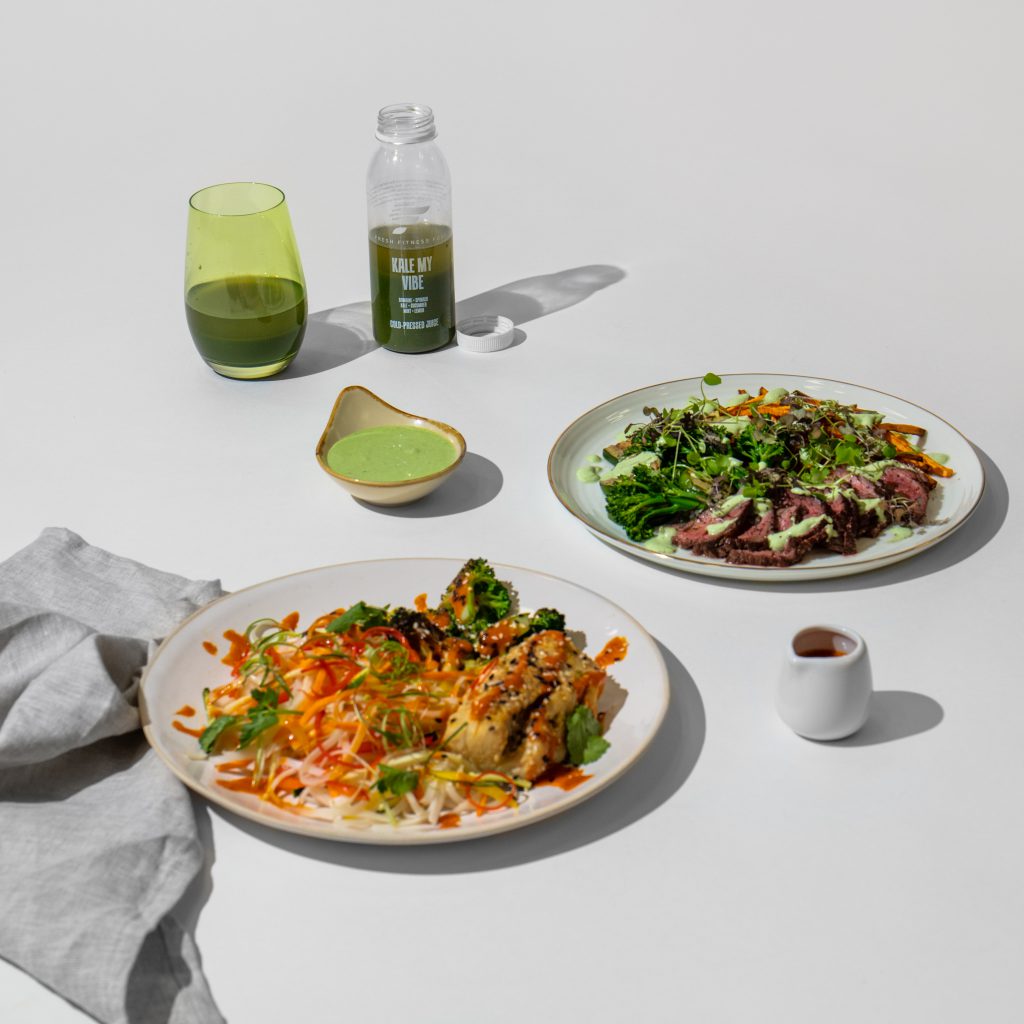3 Ways Your Diet Might Be Impacting Your Mood

Over the years research has shown links between diet and mood — how the food that we eat can impact our frame of mind, whether that be positive or negative. A number of observational studies have indicated a potential relationship between a poor diet and worse mental health (1,2).
“Reward and gratification associated with food consumption leads to the production of the hormone dopamine, which in turn activates reward and pleasure centers in the brain.”
Take a moment to think about how you feel when you haven’t eaten in a few hours – you may be snappy and irritable. Then, consider how you feel whilst you are eating your favourite Fresh Fitness Food meal — happy of course!
There are a number of factors at play that can influence mood and we’ve rounded up a few of the key players:
Dopamine
Food is a potent natural reward, and food intake is a complex process (3). Reward and gratification associated with food consumption leads to the production of the hormone dopamine, which in turn activates reward and pleasure centers in the brain. As humans, we repeatedly eat a particular food to experience this positive feeling of gratification. Sound familiar?
“Enjoyment and happiness can be attributed to good food”
Dopamine is released after eating protein, as the amino acid tyrosine, plays an important role in dopamine production. High levels increase feelings of alertness, concentration, and stress management. Low levels can lead to feelings of irritability, and moodiness (4).
For sources of tyrosine, include:
- Meat (beef, lamb, pork and chicken)
- Fish
- Dairy
- Nuts
- Soy products
Serotonin
Serotonin is often referred to as the ‘happy hormone’. It is essential to regulate our mood and to support digestion, sleep, brain function, and circadian rhythm.
The production of serotonin is influenced by the availability of its precursor, tryptophan, which is an essential amino acid, meaning the body cannot make it and it must be obtained through our diet (again, found in dietary protein).
New research also suggests that there could also be a link between gut bacteria and serotonin production (5). In particular two short-chain fatty acids, butyrate and acetate, have been shown to increase serotonin production in the gut. So, taking care of your gut could be beneficial for your mood.
Try to include gut-friendly food such as:
- Onions
- Garlic
- Jerusalem Artichoke
- Chicory root
- Bananas
B-Vitamins
In recent years, the influence of diet on mood disorders and nutritional interventions designed to improve diet quality have been reported to reduce depressive symptoms (6).
Many of the foods considered to improve diet quality and, as a result, mood, are foods based around the “Mediterranean Diet.” Such food groups are good sources of B-vitamins, including:
- Lean meats (chicken, turkey)
- Fish
- Green leafy vegetables,
- Legumes
- Nuts
B vitamin status has been linked to a benefit to brain health and mood (7). Deficiencies in these micronutrients, such as B12 or folate, have been associated with increased risk and incidence of depression (8). Although the research appears to be largely carried out in participants with mood disorders, it does pose some interesting links between B-vitamins and mood.
This is just a snapshot of a small number of factors at play when it comes to the link between diet and mood. It is a complex relationship, with a myriad of interlinking variables. It is useful to be able to recognise the emotions we exhibit in response to the food we eat and the way it makes us feel.
We need to remember that food is not just about calories — a huge amount of enjoyment and happiness can be attributed to good food!
If you would like to discuss your plan at any stage, please contact support@freshfitnessfood.com or book in for a call here to speak to a Nutritionist.
Fresh Fitness Food provides personalised meals plans delivered straight to your door, ensuring not only that you have the nutrients you need to manage your stress levels, but also that you have the time usually spent shopping, cooking and washing up, to engage in your favourite stress reducing activity. To discuss which nutrition plan is right for you, book a call with our in-house nutrition team here.
Order today and start smashing your goals with personalised nutrition!
Get £50 off a 5-day trial with code: BLOG50

References
- Jacka F.N., Pasco J.A., Mykletun A., Williams L.J., Hodge A.M., O’Reilly S.L., Nicholson G.C., Kotowicz M.A., Berk M. Association of Western and Traditional Diets with Depression and Anxiety in Women. Am. J. Psychiatry. 2010;167:305–311.
- Lai J.S., Hiles S., Bisquera A., Hure A.J., McEvoy M., Attia J. A systematic review and meta-analysis of dietary patterns and depression in community-dwelling adults. Am. J. Clin. Nutr. 2014;99:181–197.
- Singh, M., 2014. Mood, food, and obesity. Frontiers in Psychology, 5.
- Kidd, T., n.d. Emotional Appetite: The Food And Mood Connection.
- Ridaura, V. and Belkaid, Y., 2015. Gut Microbiota: The Link to Your Second Brain. Cell, 161(2), pp.193-194.
- Jacka F.N., O’Neil A., Opie R., Itsiopoulos C., Cotton S., Mohebbi M., Castle D., Dash S., Mihalopoulos C., Chatterton M.L., et al. A randomised controlled trial of dietary improvement for adults with major depression (the ‘SMILES’ trial) BMC Med.
- Kennedy D.O. B Vitamins and the Brain: Mechanisms, Dose and Efficacy-A Review. Nutrients. 2016;8:68. doi: 10.3390/nu8020068.
- Almeida O.P., Ford A.H., Flicker L. Systematic review and meta-analysis of randomized placebo-controlled trials of folate and vitamin B12 for depression. Int. Psychogeriatr.
- The Comfort of Tradition: Why We Crave Holiday Foods - December 23, 2024
- Is There a Place for Ultra-Processed Foods in Your Diet? - November 29, 2024
- Tempeh and Quinoa Power Bowl Recipe - November 7, 2024